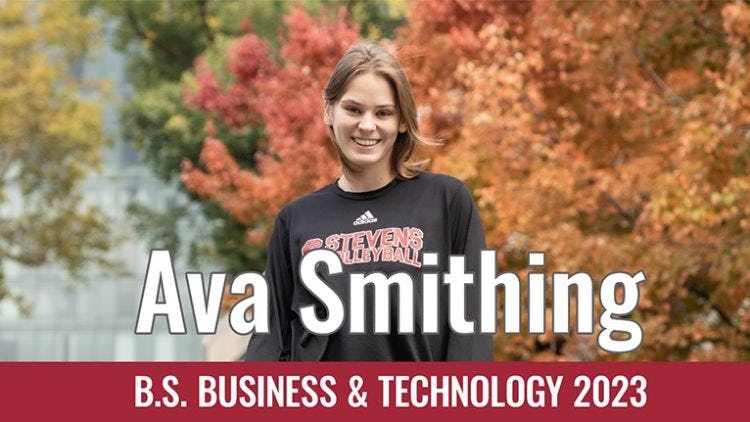Ava Smithing, '23, a student-athlete combines business, technology and public policy for the common good
Ava Smithing ’23 is passionate about mitigating the negative effects of technology through public policy and entrepreneurship. Thanks to the flexibility of the Stevens curriculum, Smithing has found a course of study that is perfect for her set of interests: a major in business and technology with a minor in public policy. She's also a member of Stevens Women's Volleyball.
“I'm so thankful that Stevens has these kinds of niche programs. Maybe, if I had gone to a different business school, I would have gotten stuck, and I wouldn't have had the opportunity to delve further into things I'm really interested in.”
Outside of class, Smithing has sought opportunities to learn more about the world of public policy and public affairs. This semester, Smithing is working part time with The Common Good — a non-profit, non-partisan organization that brings ideological opponents together for discussions. “Political polarization is a big issue, and [The Common Good] is trying to bridge that gap,” she says.
Smithing is planning the organization's annual awards gala, applying the project management skills she has developed through her coursework.
Innovating ESG
Working remotely from Nevada, Smithing conducted research for a decentralized autonomous organization at the intersection of policy and technology. She explored how to use blockchain technology to standardize the reporting of environmental, social and governance (ESG) metrics.
“I was just writing every day in the middle of the desert.”
One of the two papers Smithing wrote was about how “we can use ESG to increase corporate accountability.” While ESG metrics can be valuable and help inform consumers of corporations' sustainability practices, there’s no standard method for reporting that information. As it is now, corporations “can make up their own way of reporting, and it makes it impossible for consumers to compare them side by side,” she explains.
Smithing wants consumers to have access to clear data so that they can make purchases that correspond with their values. Her paper argues that one solution is to use blockchain technology to standardize ESG reporting. “I had to learn a lot about the technical aspects of blockchain, but I got to do it through a legal lens, which I loved,” she says.
The government could regulate ESG reporting and insist on a consistent format, requiring key metrics, using a blockchain to verify and maintain the data.
"I Don’t Want to Watch TV Anymore”
Her current internship and past research experience are two pieces of Smithing’s larger vision.
“There's so much opportunity for change in our world. We can make so many things happen, but instead of being active in it and being a part of it, we're watching it happen through this weird, distorted, little screen that makes everything crazier and more polarized than it is.”
Smithing is concerned that we are becoming more dependent on our devices and more consumed by the content on social media and television. Dr. Amber Benezra, one of Smithing’s professors, shares these concerns. “The social media business model is built around monetizing personal user data,” Benezra explains. “When data is gathered, shared, sold and controlled by corporations, it threatens democracy and individuals' right to privacy.”
Similarly, Jingyi Sun, assistant professor in the School of Business, claims that the “the main challenge at the intersection of technology and public policy is how to maintain a fair and responsible information environment without legitimating censorship.”
Thankfully, Smithing has a plan. It involves policy changes and a unique entrepreneurial venture.
“The worst part about the phone is that it’s designed to draw your attention to it,” she says. Through the entrepreneurship track of Senior Design, Smithing and her team will address that very problem. Her idea is to create an app that suggests activities to get users off their phone once they’ve reached their screen-time limit for the day.
“It'll connect you to your friends who are also done with their screen time. You can do a guided meditation, a journal prompt or read an article from a non-partisan source,” said Smithing. “If Finnegan’s was still doing that epic deal on Tuesday nights, it would suggest that you go play Jeopardy and get half-priced wings down the street.”
Looking beyond college, Smithing plans to enact policy changes to address issues of privacy, data usage, and the addictive design of apps. “When did we decide that it was okay to commodify social interaction?” she said. “It’s tearing us apart at the seams.”
If Smithing’s vision comes to fruition, we will become better-informed consumers and see the world without a filter.




